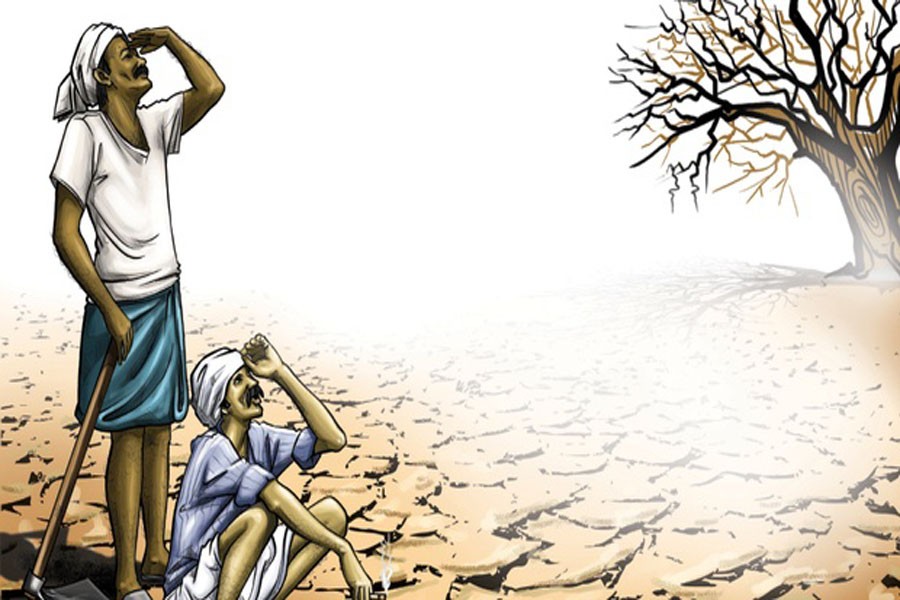
Published :
Updated :

The contribution of agriculture to the Gross Domestic Product (GDP) of Bangladesh is enormous. It reached Tk.9922.80 million in 2016, a sharp rise from Tk.7017.10 million in 2006 (Trending Economics, 2017). It is still one of the largest employment sectors in the country and employs almost half (47 per cent) of the country's total labour force.
Historically being an agrarian society, the perils and struggles of the common farmers of Bangladesh are easily ignored. We expect them to be infinitely enduring and inherently resistant to the external calamities. This way of thinking should be questioned in this era of visibly heightened global threats like climate change, particularly when our farmers are facing mental trauma because of the growing visibility of the impacts of climate change affecting their livelihoods.
Unfortunately, we have to overcome another tendency here to talk about this issue, which is the taboo regarding the aspect of mental health of our farmers. Our society deems those who face mental challenges as weak and frail and there is an ominous trend to suppress the mental health needs of individuals in our country. Let us illustrate it with an example. This year the country faced three major floods which, experts say, are climate change-induced. These floods affected the livelihoods of at least 8.0 million people, many of whom are subsistence farmers (ReliefWeb, 2017).
Floods in March and April wreaked havoc to nearly 220,000 hectares of land with crops, most of which were the ready-to-be harvested "boro" paddy. Floods in July occurred at the development stage of "Aus" paddy and at the plantation stage of "Aman" crop. To put things into the right perspective, "Aus" and "Aman" paddy crops represent about 7.0 per cent and 38 per cent of the annual output of crops respectively. Floods in August brought about an irreversible loss for 16,000 hectares of land and partially damaged the standing crops on 560,000 hectares of land (ReliefWeb, 2017). It is easy to get lost in the jugglery of statistics and forget the mental trauma the farmers had to endure. The mental health aspect of the farmers has practically been lost in the discussions on the physical and economic impacts of climate change.
However, a research organization confirms that there is undeniably a connection between mental health and climate change (Fernandez et al., 2015; Stanke, Murray, Amlôt, Nurse, & Williams, 2012). According to an article published recently in the American Journal of Nursing, some of the mental health problems the patients develop during or after a climate-related disaster shows symptoms of acute stress disorder, PTSD, depression, and anxiety. Especially, children, pregnant women, and older adults who have lower income were found susceptible to any of the above disorders (Trombley, Chalupka, & Anderko, 2017). Do the climate-change victims of Bangladesh face none of these problems? An evaluation on the mental state of the farmers who suffered a great loss is yet to be done.
It goes without saying that we have to pay close attention to the state of mental health of the flood-survivors. James Rubin, a psychologist at Kings College, London told the CNN that "One of the major health effects of flooding seems to be the mental health aspects. There is a whole host of stressors around it". His research found that among direct flood victims in the UK, 20 per cent had been diagnosed with depression, 28.3 per cent with anxiety and 36 per cent with post-traumatic stress disorder (Senthilingam, 2017).
As for the mental state of the flood victims of Bangladesh, especially of the farmers, we are at a loss but the world community is very much concerned about the issue. For example, American Public Health Association (APHA) has declared 2017 as the year of "Climate Change and Health" (APHA, 2017). That shows, among other things, that we should not waste any further time to address the issue seriously.
Research has found that an inter-sector approach that involves communities and agencies is the most appropriate way to promote the well-being and recovery of the climate-change victims. We can further address the issue by building resilience and supporting individuals and communities along with guidance from mental health professionals (APA, 2017; Stanke et al., 2012). But all these can not be properly started without the first necessary intervention, either from the public or from the private sector.
The writer is South Asian Fellow, Climate Tracker
Website: www.climatetracker.org
sajjadazimat@gmail.com


 For all latest news, follow The Financial Express Google News channel.
For all latest news, follow The Financial Express Google News channel.